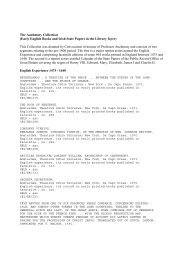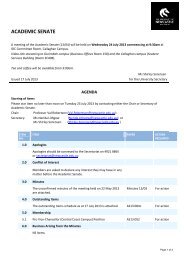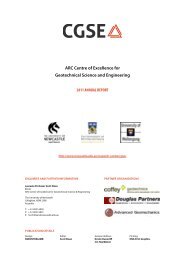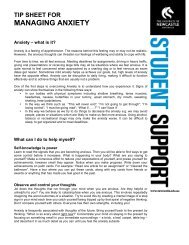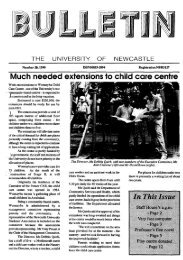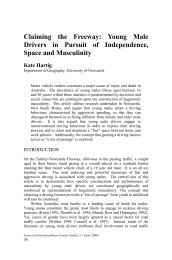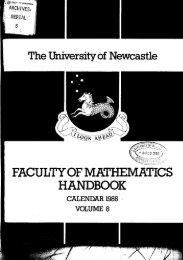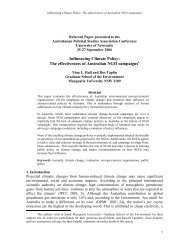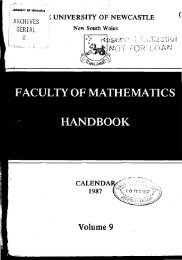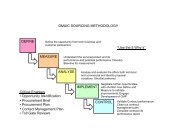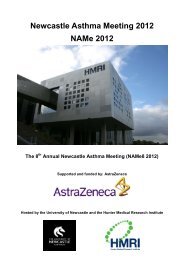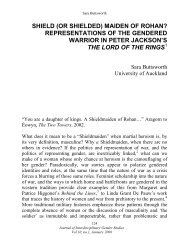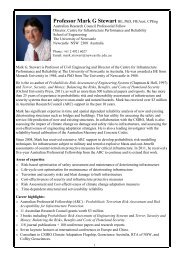n - University of Newcastle
n - University of Newcastle
n - University of Newcastle
Create successful ePaper yourself
Turn your PDF publications into a flip-book with our unique Google optimized e-Paper software.
60 AX AESTULIhS LLYOVAGE.<br />
4<br />
111 the forn~ation <strong>of</strong> the tenses ancl mocliiications, the letter r<br />
is changed into its relative liquid 1, and ?a, for the sake <strong>of</strong> euphony,<br />
is changed into ?IL by assimilation. Euphony also requires an a<br />
terminating the root to be modified into the diphthong ai ; and<br />
?d, on accouilt <strong>of</strong> the influence <strong>of</strong> the preceding i, beconles ndy.<br />
THE TESSES.<br />
There are no fewer than ten tenses in the language; besides<br />
those conlmon to most languages, some are peculiar tenses which<br />
have an aclverbial signification.<br />
The following shows the conjugation <strong>of</strong> a simple verb :-<br />
Buma, 'beat.'<br />
IKDICATIVE ~IOOD.<br />
T. 1. (Present Tense).<br />
Si.129. 1. GadcluSt bumarm I beat.<br />
2. Gindu* bunxarra Thou beatest.<br />
3. Guin* bumarra He, she, beats.<br />
Dzcal. Galli bumarra We (tno) beat.<br />
Galligu bumarra. He ancl I beat.<br />
2'11~. 1. GBanni bumarra Ti-e beat.<br />
2. Ginclugir bunlarra Tou beat.<br />
3. Gaaingulia bumarra They beat.<br />
T. 2. G~clclu bumalgarrin T! 6. Gaclclu bunlalinni<br />
3. Gadclu Lumal6;urranni 7. Gstclch~ bumalgirri<br />
4. Gaclcla bumae S. Gaclclu bunlalg~rriawagirri<br />
5. Gacldu bunlalguan 9. Gacldu bumalgarrigirri<br />
T. 10. (I;i~t.-pcrJ) Gadcln bumalyigirri.<br />
The T. numbers here iuclicate the Tenses as on pzge 26 <strong>of</strong> this rolume.<br />
ISFINITIVE.<br />
Bumalli, 'to beat.'<br />
IYPERATIVE.<br />
Siszg. 1. Bumallidyu, ' let me beat.'<br />
2. Bumalla (tbuma), ' beat thou.'<br />
3. Bumallaguin barri, ' let him beat.':<br />
Drcnl Galli bumalli, ' let us t-so beat.'<br />
Gula&alliguiina bumalli, ' let him and me beat.'<br />
PIzc. 1. Bumalli gkanni, ' let us beat.'<br />
2. Gindugir bumalla (tbuma), 'beat you.'<br />
3. Bumalla guaingulia barri, ' let them beat.'<br />
*For el~lphasis use. here-Siptg. 1. yallu or balidu, or yalludu ; 2.<br />
halnndu ; 3. balaguin. .t This abbreviated form is <strong>of</strong>ten used. : The<br />
verbs ending in -ana or -anna diEer from this in I~np. siug. 1, 2,3.<br />
TEE WIRLDIL~EI DIALECT. 61<br />
VERBAL Noux.<br />
Bumal&iclyal (bnmagidynl), ' beating.'<br />
This form, belug a rerbal noun, cau never be usecl as a participle. In<br />
the Greek lmgnage ancl the German, the infinitire sel-ves as a verbal nouu;<br />
so also the Latin supine and gerz~zdire.<br />
The forins mhicli supply our participles are classecl with the<br />
modi6cations <strong>of</strong> the verb. The subjunctive is formed mith mall<br />
a&, the optative with bai ; for there are no real subjunctive or<br />
potential forms. Sentences <strong>of</strong> that description are expressecl by a<br />
kind <strong>of</strong> auxiliary, such as garra or inallng ; or by the future<br />
tense, with the conclitional conjunction y anclu attached :-<br />
Yancl~znclu clalgirri, 'if I shoulcl eat.'<br />
Gaddu garra clalgirri, 'I can o~ moulcl eat.'<br />
Gaclclu mallag cli., ' I ~vould 01. should eat ' (07. have eaten).<br />
Yanclundu n~allag dB, 'if you clid eat' (or moulcl eat).<br />
Illalla 6; here is not a verb but a Inere subjunctive particle.<br />
Nor is there a forin for tlie passive. A kincl <strong>of</strong> passire is sometimes<br />
expressed by putting the sut?ject in the accusative, along<br />
mith the active forin <strong>of</strong> the verb ; but the source mhence conles<br />
the action is not named, for that can only be put in the agent-<br />
~wnzinative case. Hence, it must bc that this is not in reality a<br />
passive, but an active sentence ; only, for the sake <strong>of</strong> laying more<br />
emphasis on the action done, the agent is omittecl.<br />
TABLE OF COXJUG.IT:OSS, PRISCIP~L TENSES, AXD 3100~~.<br />
Present.<br />
1. Yannanna<br />
Imperfect.<br />
Yanilk<br />
Prlfect.<br />
Yan-nZn (i.e., -naiin)<br />
Guna<br />
2. Yuniia<br />
Gun8<br />
17utlnC<br />
Gaguain<br />
PnnnZn<br />
3. Gumbiga<br />
4. Bacldair-a<br />
Gumbinno<br />
Eaclilae<br />
GumbinnIn<br />
BacldalguZn<br />
5. Gadclambirra Gacldmbie Gacldaibilgniin<br />
FuCzire. I~z$~zitire.<br />
1. Yai~na~i~ri Pannagi<br />
Gagirri Gagi<br />
3. Yuqirri Tnngi<br />
In7p~mtiee.<br />
Tannacla*<br />
Gaga<br />
Ynnga<br />
3. Gumbigirri G~~cll~igi Guni!)idya<br />
4. Badalgirri Badalli Fadalla<br />
5. Gaddambilgil-ri Gacldambilli Gaclclambia<br />
This table contains all the principal tenses-those in TX-hich<br />
different conjugations vary. The other tenses <strong>of</strong> each conjugation<br />
follow the model given for the verb bnmarra. Of course, not<br />
every verb is usecl in all the tenses ; thus, yunnB, the inlperfect,<br />
is not used. The nun~be~s indicate the conjugations.<br />
P The imperative is<strong>of</strong>ten shortened; as, nacla, na; galla, ga; malla, ma.



